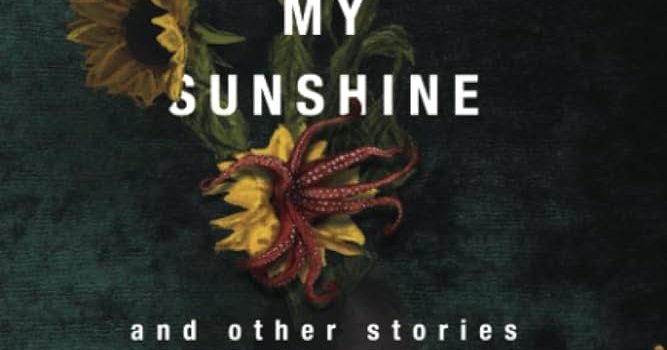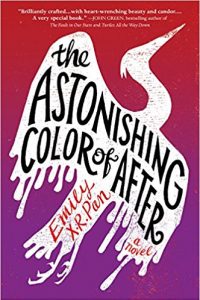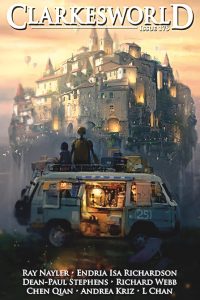Niall Harrison Reviews You Are My Sunshine by Octavia Cade
 You Are My Sunshine, Octavia Cade (Stelliform 978-1-77809-264-0, 206pp, $19.99, tp) September 2023. Cover by Rachel Yu Lobbenberg.
You Are My Sunshine, Octavia Cade (Stelliform 978-1-77809-264-0, 206pp, $19.99, tp) September 2023. Cover by Rachel Yu Lobbenberg.
Octavia Cade’s new collection You Are My Sunshine begins with ecological fury. ‘‘Look at what we woke’’ is both the first line of and a repeated refrain throughout the first story, ‘‘We Feed the Bears of Fire and Ice’’, in which heatwaves and famines are imagined by the narrator as the implacable vengeance of extinct koalas and polar bears. It’s not just what we woke, but how we woke it. The story is studded with real headlines about efforts to deny or undercut climate research – efforts to make us look away, in other words – that throw the rampaging metaphors into sharp relief, perhaps even more so because they date from 2016 and 2017 and we’re still not doing enough now. All in all, it’s a jolt that ensures you’re paying attention for the rest of the book.
It’s not all dire warning, however; Cade offers hopeful models as well, more of them as we get further into the book. In the final story, the narrator of ‘‘The History of a Coral Future’’ (new here) writes to us from a few centuries hence not of bears but of reefs, ‘‘the only metaphor that mattered’’ in a successful restructuring of society. Individual humans are now understood as reefs in the sense that we provide a scaffold for ‘‘a universe of other life: microbes, viruses, fungi’’; schools teach reef thinking by focusing on community and an expanded empathy for the natural world; cities are reconceived as reefs and made hospitable to more than just human life. The very last line of the story – and thus of the collection – tells us that these reefs are beautiful, and real, ‘‘and they are coming.’’ A phrase that would have been a threat two hundred pages earlier has become a reassurance.
These two stories set the parameters of You Are My Sunshine: every story asks how we might respond to the Anthropocene. One cluster of stories explores the grim psychology of looking directly at what we are waking. These stories often focus on scientists, with results that read a bit like Paul McAuley by way of Shirley Jackson. Perhaps the best of them is the title story (new here), set in the same continuity as Cade’s powerful 2021 novella, The Impossible Resurrection of Grief. As ecosystems collapse, many people succumb to a condition known as the Grief, a contagious depression that can spread through communities. Cyrus, a marine biologist working on starfish, which at this time means watching them die, is both a victim of someone’s Grief-induced psychosis and, potentially, succumbing to the Grief himself. Cade is excellent at the granularity of Grief-stricken thinking and powerfully dramatises the sense of a psychological trap; it’s easy to see how other variations could be explored.
If there’s a way out of the trap, Cade is among those who are clear that it has to be found on this planet. The haunting ‘‘Gone to Earth’’ sees the first astronauts sent to Mars experience chronic earthsickness even after their return (‘‘Mars was gone but the choice to go there remained’’), with ultimately desperate consequences; I felt I was reading J.G. Ballard revising the end of Kim Stanley Robinson’s Aurora. In the more meditative ‘‘You’re Not the Only One’’, meanwhile, space travel isn’t necessarily a doomed enterprise, but it is subject to significant constraints; a launch is delayed after global CO2 emissions exceed targets, emblematic of a society that has ‘‘developed the compassion not to let dreams get in the way of decency.’’ And that, in turn, segues to a cluster of stories that ask what it might mean for humans to truly see themselves as part of an ecological web, whether as an individual – ‘‘Inside the Body of Relatives’’ wittily focuses on an older woman who starts recognising her kinship with the organic components of her house, which leads her house AI to think she may be unwell (‘‘What do they prescribe for evolutionary biology these days?’’) – or a society – the spiky ‘‘Come Water, Be One of Us’’ contrasts the consequences of granting personhood to corporations and to rivers.
There are 18 stories in You Are My Sunshine, which is a lot for a short book, and some of them might seem insubstantial in isolation. A story like ‘‘Resilience’’, in which two girls meet, build sandcastles, and through their conversation reveal to us ways in which their city has become more ecologically integrated, is evocative, but really only a sketch. In context, however, it resonates with other stories about urban redesign, and with the coral future Cade proposes, and more. The book is thoughtfully sequenced to highlight such connections, and the result is that Cade’s overall project is clear, compelling, and sometimes uncompromising. It’s no easy task to look at things we are waking; and I closed You Are My Sunshine wondering, perhaps with a little trepidation, what Octavia Cade will require us to look at next.
In Niall Harrison’s spare time, he writes reviews and essays about sf. He is a former editor of Vector (2006-2010) and Strange Horizons (2010-2017), as well as a former Arthur C. Clarke Award judge and various other things.
This review and more like it in the October 2023 issue of Locus.
 While you are here, please take a moment to support Locus with a one-time or recurring donation. We rely on reader donations to keep the magazine and site going, and would like to keep the site paywall free, but WE NEED YOUR FINANCIAL SUPPORT to continue quality coverage of the science fiction and fantasy field.
While you are here, please take a moment to support Locus with a one-time or recurring donation. We rely on reader donations to keep the magazine and site going, and would like to keep the site paywall free, but WE NEED YOUR FINANCIAL SUPPORT to continue quality coverage of the science fiction and fantasy field.
©Locus Magazine. Copyrighted material may not be republished without permission of LSFF.







